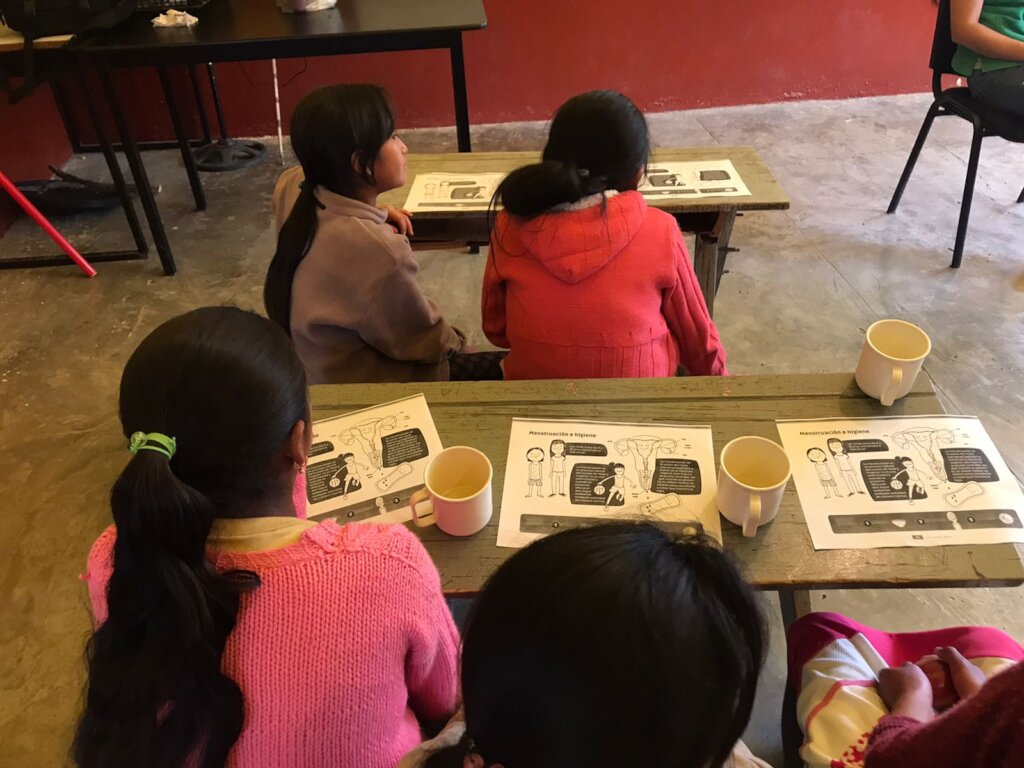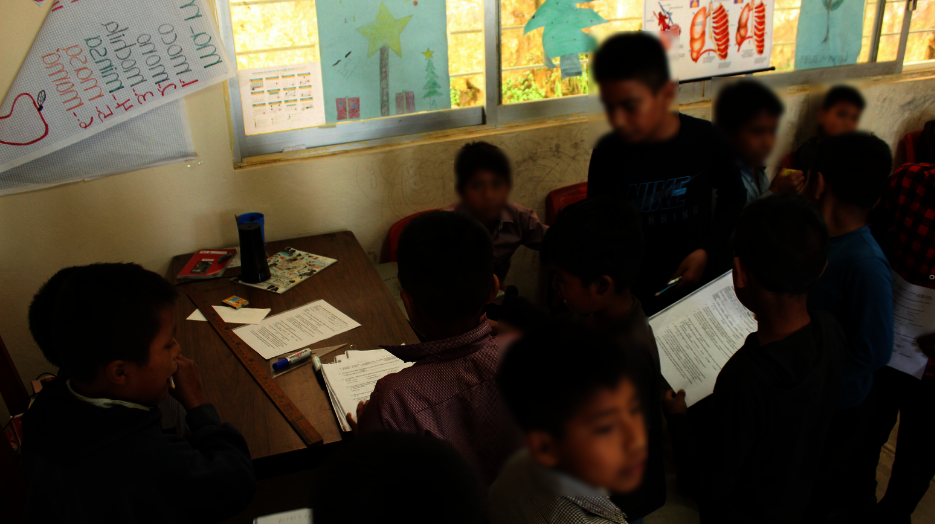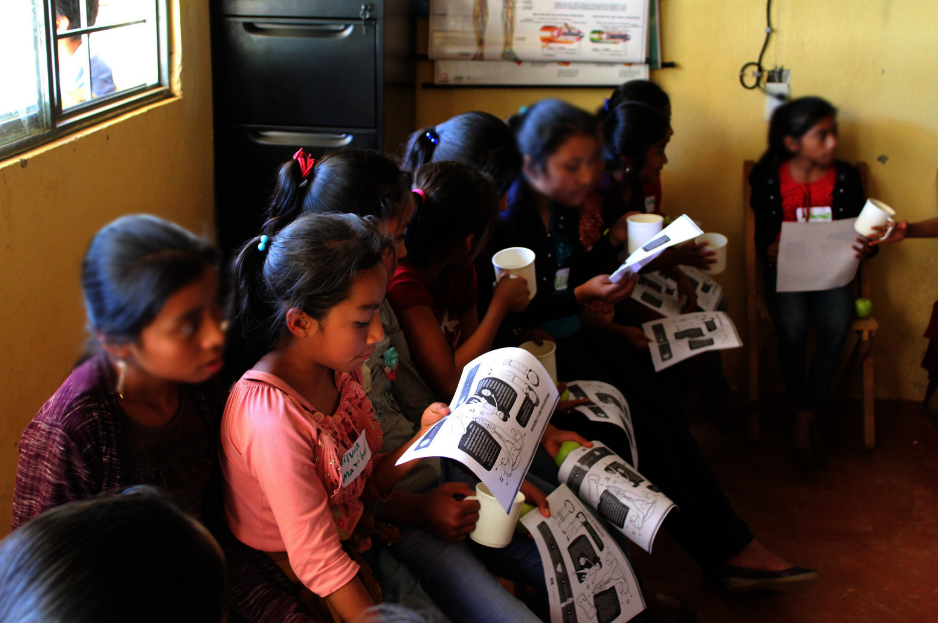By Leticia Aguilar | Project Leader
In indigenous communities, girls and adolescents at the beginning of their first menstrual period lack basic information about their sexual and reproductive health, have difficulties accessing sanitary items for menstruation, and many deal with shame and taboos surrounding the subject.
The changes that adolescence implies in women at a physical level (development of secondary sexual characteristics), at a physiological level (menarche or 1st menstruation) and at a social level (change of role in families, girl – woman) and at an emotional level, the inadequate menstrual hygiene management represents a problem that affects the health, dignity and privacy of girls and women on a daily basis, sets the challenge of fighting against gender stigma and discrimination, represents a difficult task in contexts where women social norms do not allow addressing the issue and where it is subject to prohibitions and generally manifests itself in high rates of school absenteeism and often the risk of abuse is latent (Unicef 2014).
In this 2nd stage of the project we have finished the study - diagnosis on the management of Menstrual Health and Hygiene in communities in the region of Los Altos de Chiapas. This allows us to better understand the challenges and difficulties that girls and adolescents face due to menstruation; how they experience menarche, how they deal with premenstrual syndrome, as well as describe the factors that influence the experiences of girls and adolescents during menstruation, present recommendations and propose useful and context-appropriate educational materials to create a supportive school environment for girls and adolescents, especially in the school environment.
We carried out this study on a total of 532 girls, boys and adolescents from 4th, 5th and 6th grades between the ages of 9 and 13 from five primary schools in four municipalities Teopisca, San Cristóbal, Chenalhó, Chalchihuitán, with adolescents (men and women) from 1st to 3rd grade of secondary school for ages between 12 and 17 from two secondary schools in two municipalities: Teopisca and Chenalhó.
The results will be presented in a final report that will be the basis of an educational intervention with indigenous girls and adolescents and for the preparation of educational materials according to the rural-indigenous context of the Altos de Chiapas region. By the end of April and as the third stage of the project, educational workshops will begin with the participation of girls, adolescent boys, mothers and teachers.
THANK YOU FOR SUPPORTING OUR PROJECT!
____________________________________
HIGIENE MENSTRUAL 2ª etapa del proyecto
En las comunidades indígenas, las niñas y adolescentes al iniciar su primer periodo menstrual carecen de información básica acerca de su salud sexual y reproductiva, tienen dificultades para acceder a artículos sanitarios para la menstruación y muchas lidian con la vergüenza y los tabús que rodean al tema.
Los cambios que implica la adolescencia en las mujeres a nivel físico (desarrollo de caracteres sexuales secundarios), a nivel fisiológico (menarquia o 1ª menstruación) y a nivel social (cambio de rol en las familias, niña – mujer) y a nivel emocional, el inadecuado manejo de la higiene menstrual representa un problema que afecta la salud, la dignidad y la privacidad de niñas y mujeres a diario, establece el reto de luchar contra el estigma y la discriminación de género, representa una tarea difícil en contextos donde las normas sociales no permiten abordar el tema y donde está sujeto a las prohibiciones y generalmente se manifiesta en altas tasas de ausentismo escolar y muchas veces el riesgo de abuso está latente (Unicef 2014).
En esta 2ª etapa del proyecto hemos terminado el estudio – diagnóstico sobre manejo de la Salud e Higiene Menstrual en comunidades de la región de los Altos de Chiapas. Esto nos permite comprender de mejor manera los retos y dificultades que enfrentan las niñas y adolescentes debido a la menstruación; cómo experimentan la menarquia, de qué manera afrontan el síndrome pre menstrual, así como describir los factores que influyen en las experiencias de las niñas y adolescentes durante la menstruación, presentar recomendaciones y proponer materiales educativos útiles y acordes al contexto para crear un ambiente escolar de apoyo para las niñas y adolescentes, sobre todo en el ambiente escolar.
Realizamos este estudio a un total de 532 niñas, niños y adolescentes de 4º, 5º y 6º en edades entre 9 y 13 años de cinco escuelas primarias en cuatro municipios Teopisca, San Cristóbal, Chenalhó, Chalchihuitán, con adolescentes (hombres y mujeres) de 1º a 3ero de secundaria en edades entre 12 y 17 años de dos escuelas secundarias en dos municipios: Teopisca y Chenalhó.
Los resultados serán presentados en un informe final que será la base de una intervención educativa con niñas y adolescentes indígenas y para la elaboración de materiales educativos acordes al contexto rural – indígena de la región Altos de Chiapas. Para finales del mes de abril y como tercera etapa del proyecto, se iniciarán los talleres educativos con la participación de niñas, niños adolescentes, madres de familia y docentes.
¡GRACIAS POR APOYAR NUESTRO PROYECTO!
Links:
Project reports on GlobalGiving are posted directly to globalgiving.org by Project Leaders as they are completed, generally every 3-4 months. To protect the integrity of these documents, GlobalGiving does not alter them; therefore you may find some language or formatting issues.
If you donate to this project or have donated to this project, you can receive an email when this project posts a report. You can also subscribe for reports without donating.


